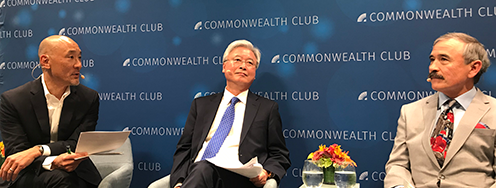More Light on Nuclear Budget Numbers
This week, a lively debate has broken out around how much our nation actually spends on maintaining our nation's nuclear arsenal. It's a refreshing level of scrutiny on a pocket of spending that has been largely unaccountable.
After Ploughshares Fund's widely cited calculation of $700 billion in projected spending on nuclear weapons and related programs was questioned by the Washington Post, we immediately responded expressing continued confidence in our estimate. As Joe Cirincione put it:
Our estimate -- based on the best publicly available data -- is a reasonable accounting of the actual investment that the U.S. is making in outdated Cold War nuclear weapons and related programs,” he added. “We believe is it far more accurate than budgets claims that hide the true costs to our troops and our nation of these programs.
Since then, several expert organizations have weighed in to add their own viewpoints to the debate.
In a statement sent to modify his earlier comments in the Post story, noted nuclear numbers guru Stephen Schwartz of the James Martin Center for Nonproliferation Studies effectively points out the core of the debate. Nuclear spending has too long been shrouded in secrecy.
The problem is not ... that the government ‘has never officially disclosed the exact cost,’ it’s that no one knows the exact cost because all the relevant data have never been collected and analyzed. For a program that has consumed an estimated $8.7 trillion (in inflation-adjusted 2010 dollars) since 1940, making it the third most expensive government program of all time, that is simply unacceptable, and it should be unacceptable whether one believes current and proposed future spending is too much or too little.
Others commenting on the debate, like the Project on Government Oversight, have acknowledged the difficulty of calculating an exact figure, and agreed with us that the "official" administration figures often do not represent spending levels that actually occur.
Both the DOE’s nuclear projects and several DoD programs have long been on the Government Accountability Office’s (GAO) “high risk” list. The GAO names DoD’s financial management as an area that needs great improvement and has found that “Defense acquisition programs usually take longer, cost more, and deliver fewer quantities and capabilities than DOD originally planned.” And some of DOE’s biggest projects in recent years have seen skyrocketing cost estimates, accounting for billions of additional dollars to be spent. The GAO also cited such problems as project schedules “not linked to technical or budget realities,” and cases where “financing decisions were not as fully informed or as transparent as they could have been.”
Both the DOE and the DoD need a dose of realism in their budget estimates, which could help avoid such vast discrepancies as we’re seeing between the overall nuclear budget estimates of the administration and of Ploughshares.
Congress is currently debating the defense budget, so the debate over nuclear weapons spending could have real consequences. The National Security Network reports today that:
"...with House Majority Leader Eric Cantor working to renegotiate the terms of the Budget Control Act and delay reductions to the Pentagon's budget. House members are arguing over the inflated cost of our nuclear weapons complex, as the U.S. plans to replace the three delivery platforms for our nuclear arsenal, the cost of which has grown 25 percent over the past year. Experts in and out of government have called for reexamining the weapons' deterrent value and ballooning costs - just one of many examples of why lawmakers from both sides of the aisle continue to support smart, strategic reductions in military spending."
Budget cutting is often contentious. As increasing pressure to cut nuclear spending increases, those with who wish to maintain the status quo are likely to push back harder than ever. We hope that in the end, common sense will prevail. As Eric Sapp of the American Values Network writes today,
It's the 21st Century. The Soviet union crumbled 20 years ago. We didn't use a nuke to kill bin Laden. And it's time for Congress to face the fact that they can either support our troops, or support nukes. You can't do both.
For more on how we calculated our number check out our White Paper and commentaries by Taxpayers for Common Sense and Nukes of Hazard.



